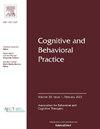A Brief Parent Training Program Using Cognitive-Behavioral Techniques for Pediatric Avoidant/Restrictive Food Intake Disorder: A Pilot Study
IF 2.9
3区 心理学
Q1 PSYCHOLOGY, CLINICAL
引用次数: 0
Abstract
Eating disorder (ED) treatment is notoriously inaccessible due to geographic, financial, and/or time barriers. The current study proposes a novel treatment for avoidant/restrictive food intake disorder (ARFID) to increase access to care for this novel ED. ARFID Parent Training Program (ARFID-PTP) is a two-session, virtual treatment utilizing evidence-based components for pediatric ARFID. Participants (n = 7) ages 5–12 and their parents completed an intake session, two sessions of treatment, end-of-treatment measures, and 4-week follow-up measures. Acceptability was assessed via the CEQ-C and satisfaction questions provided at end-of-treatment. Feasibility was assessed via recruitment and retention rates, treatment adherence, and need for a booster session (e.g., problem-solving session) at 4-week follow-up. Overall, ARFID-PTP was considered an acceptable treatment approach; however, markers of feasibility, such as treatment nonadherence (low completion of daily food exposures), indicate further testing should implement modifications to treatment. We propose modifications to address feasibility concerns with the goal of continuing to assess ARFID-PTP in a randomized controlled trial.
使用认知行为技术治疗小儿回避型/限制型食物摄入障碍的简短家长培训计划:试点研究
众所周知,由于地理、经济和/或时间的障碍,饮食失调(ED)的治疗是难以获得的。目前的研究提出了一种新的治疗回避/限制性食物摄入障碍(ARFID)的方法,以增加对这种新型ED的护理机会。ARFID家长培训计划(ARFID- ptp)是一种利用循证成分对儿童ARFID进行的两次虚拟治疗。年龄在5-12岁的参与者(n = 7)和他们的父母完成了一次入院治疗、两次治疗、治疗结束措施和4周的随访措施。通过CEQ-C和治疗结束时提供的满意度问题来评估可接受性。可行性评估通过招募和保留率,治疗依从性,并在4周的随访中需要加强会议(例如,解决问题的会议)。总的来说,ARFID-PTP被认为是一种可接受的治疗方法;然而,可行性的标志,如治疗不依从(低完成每日食物暴露),表明进一步的测试应该实施治疗的修改。我们提出修改,以解决在随机对照试验中继续评估ARFID-PTP的可行性问题。
本文章由计算机程序翻译,如有差异,请以英文原文为准。
求助全文
约1分钟内获得全文
求助全文
来源期刊

Cognitive and Behavioral Practice
PSYCHOLOGY, CLINICAL-
CiteScore
4.80
自引率
3.40%
发文量
118
审稿时长
84 days
期刊介绍:
Cognitive and Behavioral Practice is a quarterly international journal that serves an enduring resource for empirically informed methods of clinical practice. Its mission is to bridge the gap between published research and the actual clinical practice of cognitive behavior therapy. Cognitive and Behavioral Practice publishes clinically rich accounts of innovative assessment and diagnostic and therapeutic procedures that are clearly grounded in empirical research. A focus on application and implementation of procedures is maintained.
 求助内容:
求助内容: 应助结果提醒方式:
应助结果提醒方式:


